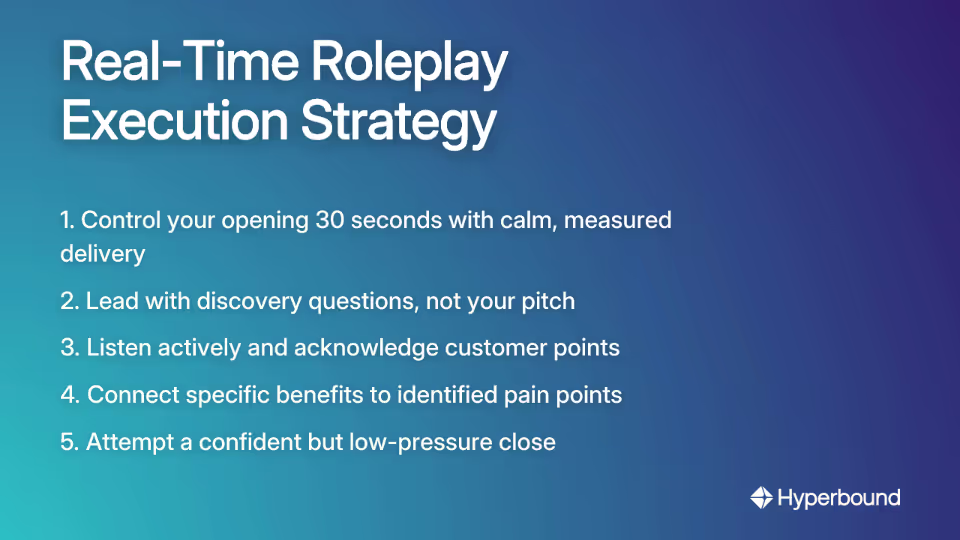
Your palms are sweating. Your mind races with potential scenarios. The mere thought of performing a sales roleplay in front of judging eyes makes your stomach twist into knots. If you're experiencing this right now, take a deep breath – you're not alone.
Sales roleplays are notorious for causing anxiety, even among experienced professionals. That artificial conversation where you're expected to seamlessly qualify the customer, handle objections, and close a deal while maintaining perfect composure? It's daunting.
But here's the first truth you need to embrace: this anxiety is completely normal. And more importantly, it's manageable.
Understanding What Sales Roleplays Are Really Testing
Before we tackle how to calm those nerves, let's reframe what's actually happening during a sales roleplay interview.

Many candidates mistakenly believe they're being evaluated solely on their ability to deliver a flawless pitch or make the sale. This misconception creates unnecessary pressure. In reality, hiring managers are primarily assessing:
- Your communication skills: Can you articulately engage with clients and clearly convey information?
- Your ability to maintain composure: Will you stay professional and patient when faced with difficult situations?
- Your listening and adaptability: Are you genuinely trying to understand the client's needs or just waiting to talk?
As one sales professional on Reddit aptly noted, "Can you communicate? They want to know they can put you in front of customers and that you can speak and engage clearly." This perspective immediately makes the challenge less intimidating.
A good sales manager isn't looking for a perfect performance – they're looking for someone who can connect, adapt, and maintain professionalism under pressure.
Reframing Your Mindset: It's a Conversation, Not a Performance
The biggest mental shift that will help reduce your anxiety is to stop viewing the roleplay as a performance and start treating it as a conversation.
Sales isn't about delivering monologues; it's about dialogue. The best salespeople don't just pitch products – they build relationships through meaningful engagement. As another Reddit user wisely explained, "A good salesperson asks a ton of questions to qualify the customer, and then would pitch after."
This shift in perspective transforms the roleplay from a high-pressure test into a more natural exchange. You're simply having a conversation to understand someone's needs and determine if your solution can help them.
It's a common observation that practice roleplays can feel more stressful than real client interactions. By embracing the exercise as a genuine conversation, you'll not only reduce anxiety but also demonstrate the authentic communication skills employers are looking for.
Your Step-by-Step Preparation Plan
Preparation is your best weapon against roleplay anxiety. Here's a comprehensive plan:

1. Research Thoroughly
Before your interview, gain a solid understanding of the company's products, market position, and target customers. As recommended on Reddit, "Read the website, be ready to parrot some company marketing as a response." This knowledge provides a foundation of confidence that will carry you through uncertain moments.
Review the job description carefully to identify the specific skills the employer is prioritizing. Are they emphasizing objection handling? Customer qualification? Closing techniques? Align your preparation accordingly.
2. Practice Strategically
Practice doesn't just build skills – it actively reduces anxiety. Roleplaying in a safe environment helps prepare for anxiety-inducing events by creating familiarity and reducing the element of surprise.
Follow these practice guidelines:
- Schedule dedicated time: Practice when you're calm, not when you're already stressed.
- Role-reverse: Ask a friend to demonstrate, then you practice at least three times.
- Simulate common scenarios: Prepare for typical situations like:
- A candidate who isn't looking for a job
- A client who says they aren't hiring
- A prospect with budget concerns
While practicing with colleagues is valuable, coordinating schedules can be difficult. For truly scalable and consistent practice, consider using an AI-powered tool. Platforms like Hyperbound offer AI Sales Roleplays that let you practice critical conversations against realistic AI buyer personas, anytime you want. This allows you to get unlimited "reps" in a pressure-free environment, building confidence and mastering your talk tracks.
3. Create a Flexible Framework
While memorizing a rigid script can backfire, having a flexible framework will keep you organized without sounding robotic:
- Opening: A confident introduction that establishes rapport
- Discovery: A set of prepared qualifying questions to understand needs
- Value proposition: Key benefits of your offering, ready to be tailored
- Objection handling: Prepared responses to common concerns
- Close: A clear call to action
Execution: Navigating the Roleplay in Real Time
When the moment arrives, these strategies will help you maintain that crucial calm demeanor:

Control the First 30 Seconds
The beginning sets the tone. Take a deep breath, maintain eye contact, and speak at a measured pace. According to Indeed, these physical cues not only signal confidence to others but actually help you feel more confident internally.
Read the provided scenario carefully and use any prep time to mentally organize your approach.
Lead with Questions, Not Your Pitch
Remember that your primary goal is client engagement through discovery. Open with questions that help you understand their situation before attempting to sell anything.
Effective qualifying questions might include:
- "What challenges are you currently facing in this area?"
- "What solutions have you tried before?"
- "What would an ideal outcome look like for you?"
This approach demonstrates your consultative selling style while giving you valuable information to tailor your response.
Listen More Than You Talk
Roleplays are designed to test listening skills as much as speaking skills. The "customer" might even make false claims to see if you're paying attention. Show active listening by:
- Acknowledging their points
- Asking follow-up questions
- Summarizing their needs before presenting solutions
Connect Benefits to Pain Points
Once you've identified challenges through your questioning, clearly illustrate how your product or service addresses those specific pain points. This shows you're not just selling features but providing solutions.
Attempt a Confident Close
Always try to finalize next steps, even if it's just scheduling another meeting. This demonstrates your results-orientation. Consider using low-pressure closing phrases like:
- "Based on what you've shared, I think [solution] would address your [specific challenge]. Should we schedule a deeper dive into how this would work for your team?"
- "Would you be comfortable moving forward with a trial to see these benefits firsthand?"
Handling the "I Don't Know" Moment
One of the biggest fears in roleplays is facing a question you can't answer. This moment often triggers panic, but it shouldn't. How you handle uncertainty speaks volumes about your professionalism.
The cardinal rule: Never lie or bluff.
Instead, use these proven phrases that maintain your credibility:
- "That's an excellent question. I want to make sure I get you the correct information, so I'll find that out and follow up with you."
- "I'm not 100% sure on that specific detail. Let me check with our product specialists and get back to you with the accurate answer."
This approach demonstrates honesty, resourcefulness, and customer focus – qualities that impress interviewers far more than pretending to know everything.
After the Roleplay: Securing the Impression
When the roleplay concludes:
- Ask for feedback: This shows your commitment to improvement and coachability.
- Reflect on the experience: Mention one thing you learned or would approach differently, demonstrating self-awareness.
- Follow up on unanswered questions: If you promised to find information, include it in your thank-you email to show reliability.
Remember the Real Goal
The ultimate purpose of a sales roleplay isn't to make a perfect pitch or even to "close the deal." The goal is to demonstrate how you:
- Build rapport
- Engage in meaningful discovery
- Present relevant solutions
- Handle objections professionally
- Maintain composure under pressure
As one Reddit user wisely advised, "Don't go full Shakespeare on the role play, but definitely get into the role." Embrace the exercise as an opportunity to show who you are: a thoughtful, resilient, and effective communicator ready for real-world client interactions.

Sales roleplays might never be completely stress-free, but with the right preparation, mindset, and strategies, you can transform that anxiety into focused energy that showcases your true capabilities. The next time you face a roleplay, remember: it's just a conversation, you're prepared for this, and even the "I don't know" moments are opportunities to demonstrate your professionalism.
Now take a deep breath, and show them what you've got.
Book a demo with Hyperbound
.png)













